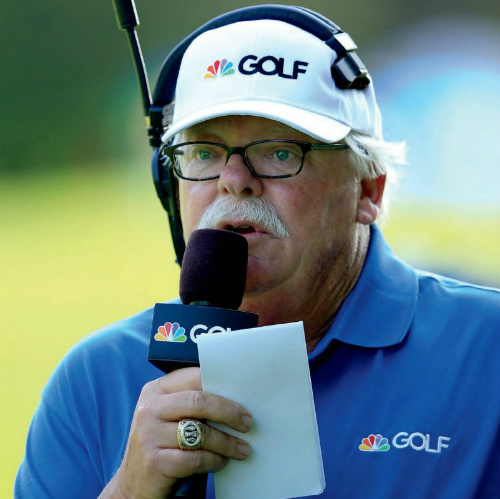
One of the game’s great voices reflects on the past
and looks ahead to a new challenge.
Roger Maltbie turned 67 years olf this summer — and he’s still going strong. He amassed five wins during his PGA Tour career, but Maltbie’s leaving his mark in the broadcasting world as an on-course analyst for NBC Sports. His comfortable style of walking the fairways has endeared “Rog” to golf fans across the world. I caught up with Maltbie during his break from PGA Tour coverage.
John Maginnes: What do you remember about Sedgefield and the old GGO?
Roger Maltbie: Well, I’ve played it with friends since and love the golf course. Going all the way back to the mid 70s, I don’t remember much. I remember that it was cold. Maybe Greensboro in March or early April wasn’t such a great idea. August makes a lot more sense, and the golf course looks great during the tournament.
JM: Tell us about the core group at NBC that you’ve worked with for so long.
RM: We’re getting a little long in the tooth there, pal. We’ve been together a long time. This is my 27th year, Johnny Miller’s 29th year, and Mark Rolfing was there before me. Gary Koch has been there since 1997. Dan Hicks has been in the booth since 1993. And of course, the rookies are Peter Jacobsen, Notah Begay, and Jim “Bones” Mackay.
JM: How has it been working with Bones, Phil Mickelson’s former longtime caddie?
RM: We did an experiment at Sea Island with Bones and John Wood, who caddies for Matt Kuchar. I took them out on the course and showed them how to do this job — this is where you stand, this is what you do. Bones is a quick learner and he does a good job. A caddie really does offer a different perspective. We ask him, “What would you tell a guy, what would your advice be?” It’s been a nice fit.
JM: And inevitably, we have a little more insight into Phil Mickelson’s thinking.
RM: Really, who looks at life or golf like Phil? How do I say this with the utmost respect — you can call Phil a lot of things, but you can’t call him doubtful. Phil’s confidence is his greatest asset, whether the rest of the world follows along or not.
JM: What have you made of the return of Tiger?
RM: It’s great that he’s healthy again. Whether he catches Jack or not almost doesn’t matter. Who knows? But it’s a shame to see someone get robbed of the opportunity because of a physical problem. Now he seems to have that cured and he can go after it hard, so now we might get to see if he can do it, but that is going to be the burden for him.
JM: For a long time, the flagship event for NBC was the US Open. How hard is it for you to watch someone else do the event?
RM: It was a business decision. We understand that money
talks and everything else walks, and that’s fine. We were out bid, so the USGA took their TV affiliation to a different place. Do I miss it? Yeah, I miss it. It’s our national championship, and certainly our first major. What I do is great fun. But there is some golf that is more meaningful, and we are talking about the US Open. To have those opportunities to cover the events was special. They are special events. They were special when we played, and special when we broadcast. So yeah, it’s a little painful to watch sometimes.
JM: As part of the shuffle of television contracts, NBC now does the Open Championship. What is that like?
RM: It’s different for me, because I only played in the British Open twice. Back then, we called it the British Open, but now it’s the Open Championship. Both times I played in it were at Turnberry, so I’m learning courses like Carnoustie for the first time, which is fun. [He pauses and smiles.] And it’s the next time that I work.